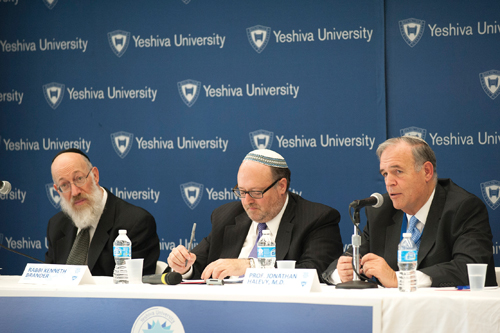.jpg)
New York, NY—As Americans across the country debated the ethical, legal and practical ramifications of Obamacare, Yeshiva University’s Student Medical Ethics Society (MES,) a student club mentored by YU’s Center for the Jewish Future (CJF,) looked to the Israeli medical system as the framework for a very different kind of conversation: What does universal health care look like in a country bound by Jewish law?
That question was at the heart of MES’ eighth annual Fuld Family Conference, titled “Prescribing for a Nation: Examining the Interplay of Jewish Law and Israeli Health Care.” The October 20 event explored the ways in which Israeli medical institutions utilize Jewish law to form national policy as well as important ethical and halachik [Jewish legal] questions that emerge from practicing medicine in Israel.
Dr. Jonathan Halevy, director general of Shaare Zedek Medical Center and a key figure in the formation of Israel’s national medical policy, delivered the keynote address, “Jewish Values in the Israeli Health Care System.” His remarks focused on the singular nature of Israel as a Jewish democratic state and public debate about whether these seemingly incongruous identities can coexist, with particularly close analysis of several recently-enacted laws—such as The Dying Patient Law, The Good Samaritan Law and The Brain/Respiration Death Law—based on Jewish values and halakha, which play an important role in the day-to-day practice of Israeli hospitals and its health care system.
Halevy’s talk was followed by a discussion between himself, Rabbi Mordechai Willig, Rabbi Dr. Sol Roth Professor of Talmud and Contemporary Halacha at YU-affiliated Rabbi Isaac Elchanan Theological Seminary; and Rabbi Kenneth Brander, YU vice president of university and community life and David Mitzner Dean of the CJF, of Teaneck, NJ, about the unique medical questions that arise in treating a very high concentration of the world’s Jewish population. Rabbi Willig highlighted some of the more challenging issues that arise in a primarily Jewish country but are equally relevant across the Atlantic Ocean, such as beginning of life and fertility concerns as well as transplants, while Halevy spoke about a few ways those issues are handled in Israel.
Another plenary session on Israeli methods of responding to medical crises and terror attacks featured Dr. Mitchel Schwaber, director of the National Center for Infection Control at the Israel Ministry of Health and a staff physician of Israel’s renowned mobile trauma hospital in Haiti; Yitzchak Shalita, member of the Israel Defense Force Search and Rescue Team and a longtime Magen Dovid Adom and ZAKA volunteer; and Rabbi Yosef Blau, senior mashgiach ruchani [spiritual advisor] at YU. The panel was moderated by Dr. Michel Frogel, president-elect of American Physicians and Friends for Medicine in Israel, and detailed the ethical issues encountered in natural disasters and terror strikes, as well as Israeli strategies and measures for dealing with these situations and the religious imperative of Jewish outreach.
In the afternoon, breakout sessions featuring an assortment of speakers and topics took place. Talks included “Special Ops and Giving Faith a Chance: Understanding the Secret Life of ZAKA International and the Legal Ethics Behind Jewish End-of-Life Rescue,” led by Rabbi Zvi Gluck, chief executive officer of Zaka, and Mark J. Kursmann, a principle at Kurzman Law Offices, P.C.; “Building a Modern Hospital According to Halacha,” led by Halevy; “Solutions for the Future: Solving Infertility and Genetic Challenges in Israel,” led by Rabbi Dovid Fuld; and a continuation of “Responding to Disaster” discussion broken into two parts, one focusing on “The APF: American Physicians; Strengthening Israeli Medical Infrastructure from Across an Ocean,” led by Frogel, and the other focusing on “Haiti: The Extended Story,” led by Schwaber.
“The unique thing about a program like this is that not only does it bring together experts on topics of such critical importance, but it’s all student-run,” said Rabbi Brander. “To have students give of themselves so completely to provide this kind of forum for our community is truly a leadership incubator for our society.”
The annual conference is sponsored through the generous support of Rabbi Dovid and Mrs. Anita Fuld. “It’s a privilege for us to have our small cheilek [share] in the Medical Ethics Society of YU,” said Rabbi Fuld. “The students here are privileged to grow in a medium of chachma [wisdom] and kedushah [holiness] together. This place is a star and has been so for awhile.”
“I’m so impressed by everything the students run here and the topics are so fantastic,” said Debbie Ross, a nurse currently working in clinical informatics at Holy Name Medical Center in Teaneck, NJ. Recalling how the hospital had consulted with Shaare Tzedek before building its new emergency room, Ross said that she found the Medical Ethics conferences especially helpful because she was often asked to explain halachik issues regarding Jewish patients at work. “I’m here to see what else I can learn,” she said.
All conference sessions are available online at YUTorah.org.
By Matt Yaniv










